Key takeaways:
- Integrating ethical considerations and sustainable practices leads to stronger customer relationships and increased loyalty.
- Building a sustainable supply chain requires transparent communication, assessment of suppliers, and a commitment to renewable resources and waste reduction.
- Adapting sales practices to local markets and engaging with communities enhances understanding and innovation, crucial for successful international sales.
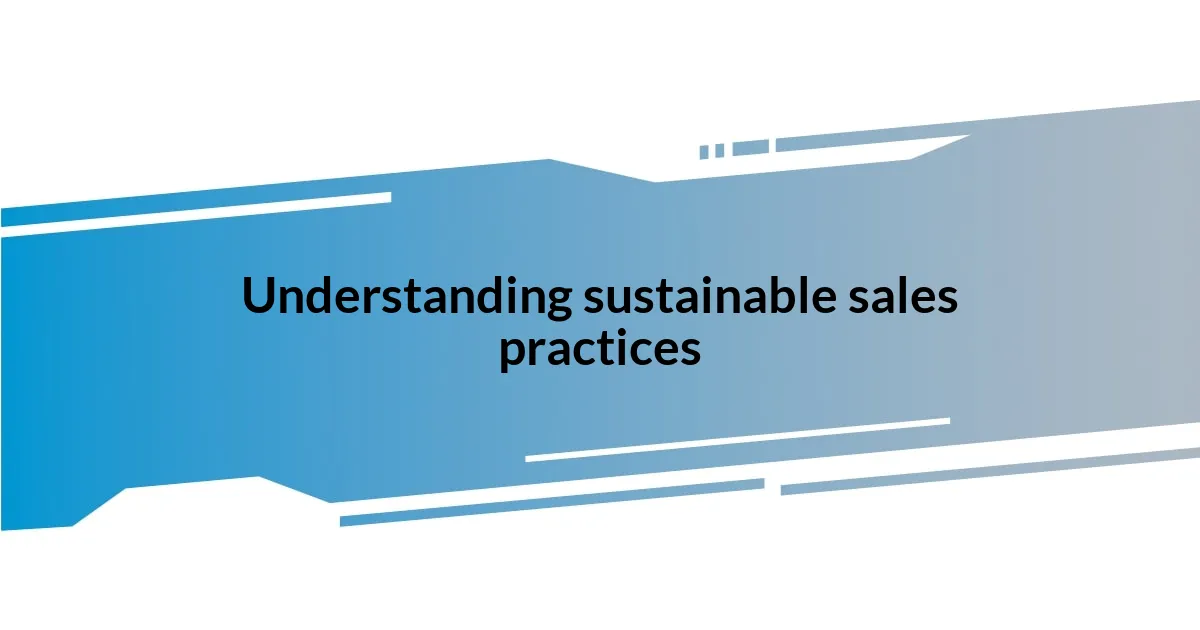
Understanding sustainable sales practices
Sustainable sales practices are about integrating ethical considerations into every aspect of selling. I remember a time when I focused solely on closing deals, but then I realized how much more rewarding it was to build relationships based on trust and respect for the environment. Can you imagine how empowering it feels to know that your sales efforts contribute to a healthier planet?
Consider the impact of your product choice on sustainability. For example, when I decided to promote eco-friendly packaging, not only did my sales increase, but I also noticed how my customers appreciated the change. It’s those small shifts that can have a monumental impact on one’s business and the world, right?
Engaging in sustainable practices means being accountable for your supply chain. I’ve encountered suppliers who cut corners to save costs, and witnessing that made me reconsider who I partner with. Isn’t it essential to ask ourselves: what values do we want our sales practices to reflect?

Importance of ethical sourcing
Ethical sourcing isn’t just a buzzword—it’s crucial for maintaining integrity in international sales. I’ve noticed that when I prioritize sourcing materials responsibly, it creates a ripple effect of trust and loyalty among my customers. You see, when people understand that the products they’re buying come from ethically-responsible suppliers, it fosters a deeper emotional connection to the brand.
- Builds consumer trust and enhances brand reputation.
- Reduces the risk of involvement in unethical labor practices.
- Supports local economies and sustainable communities.
- Encourages transparency in the supply chain.
- Drives innovation in sustainable product development.
I remember a time when I shifted my focus to sourcing only from companies committed to fair labor practices. Not only did it feel good on a personal level, but my clients also appreciated knowing they were investing in something meaningful. This choice resulted in increased customer loyalty, which is a fantastic reminder of how ethical sourcing can lead to tangible benefits for both business and society.
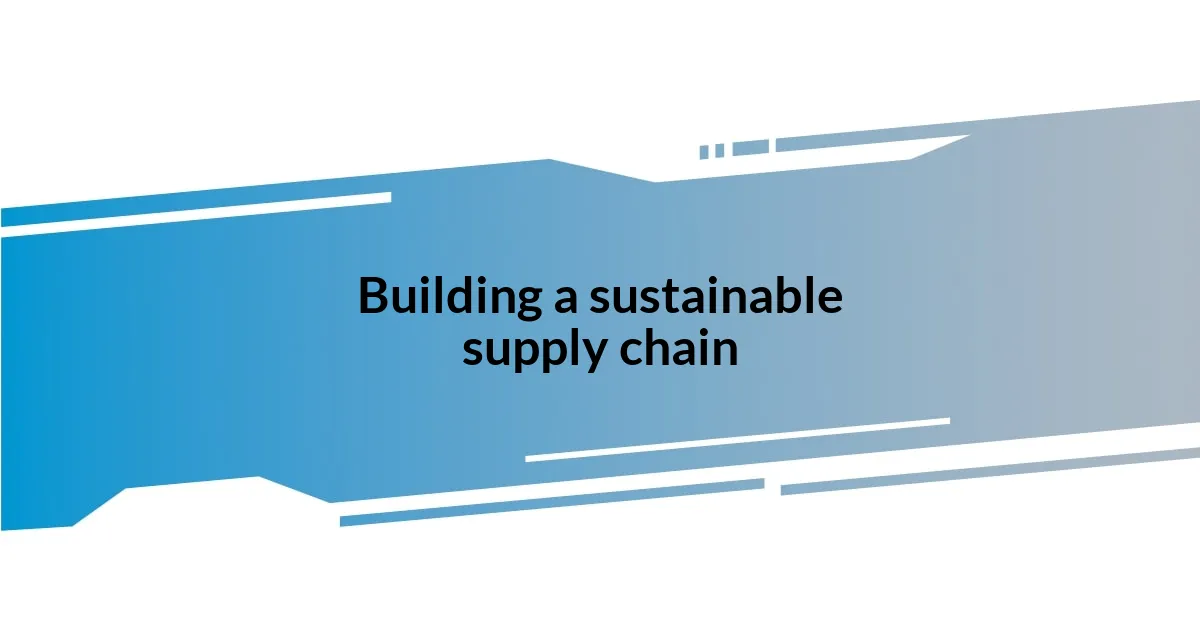
Building a sustainable supply chain
Building a sustainable supply chain goes beyond mere compliance; it requires a deep commitment to ethical practices. In my experience collaborating with suppliers, I learned that assessing their ecological footprints can greatly influence our shared sustainability goals. I got quite an eye-opener when I uncovered that one of my suppliers was using energy sources that were harmful to the environment. I made the tough decision to pivot to another supplier who prioritized renewable energy, and not only did it align with my values, but it also inspired others in my network to seek similar sustainable partnerships.
As we strive for a sustainable supply chain, it’s essential to create transparent communication channels with suppliers. I can’t stress enough how vital it was for me to initiate regular check-ins and collaborations on sustainability initiatives. This not only helped in building robust relationships but also fostered an environment where we could collectively innovate to minimize waste. By promoting open discussions about sustainability, I found that even small suppliers were more than willing to adapt and implement eco-friendly practices once they recognized their contributions mattered.
Here’s a table that highlights various aspects of building a sustainable supply chain:
| Aspect | Importance |
|---|---|
| Supplier Assessment | Identifying ethical practices and ecological footprints fosters accountability. |
| Transparent Communication | Open dialogue ensures alignment on sustainability goals and innovations. |
| Renewable Resources | Utilizing sustainable energy solutions positively impacts our environment. |
| Waste Reduction | Collaborating to minimize waste encourages businesses to contribute to a circular economy. |
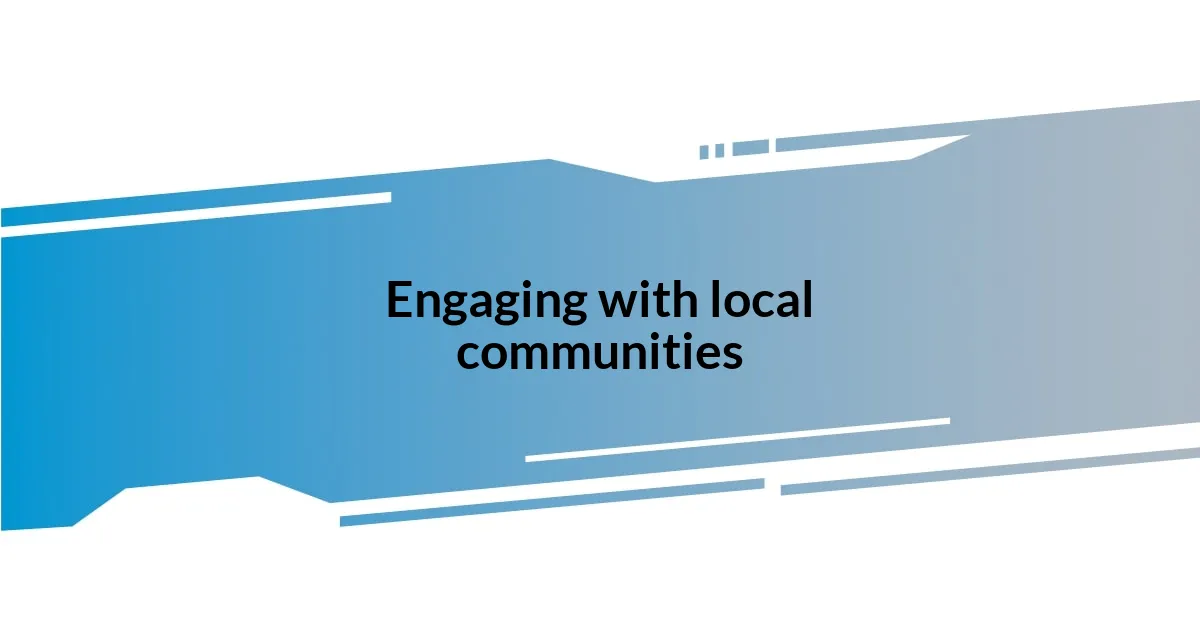
Engaging with local communities
Engaging with local communities is truly a game-changer in sustainable international sales. I recall attending a community event during a business trip; the warmth and openness of the locals made me realize how vital these connections are. It turned into a two-way street, where I not only shared my products but also gained insights into their needs and concerns, which ultimately shaped my approach to product development.
When I actively participated in local events, the bond with the community deepened significantly. I remember one local artisan who crafted unique pieces from recycled materials. By collaborating with her, we not only showcased her talent but reinforced our commitment to sustainability. Isn’t it inspiring when community relationships can lead to innovative product ideas? These partnerships often lead to more meaningful sales experiences for both the company and the consumer.
Understanding cultural nuances is another crucial aspect. I once found myself misinterpreting local customs in a new market. It was a little embarrassing but became an opportunity for growth. By openly acknowledging my misstep and engaging the community in conversation, I learned so much more about their values and preferences. Such interactions drive home the importance of genuine engagement—it’s about listening as much as it is about selling.
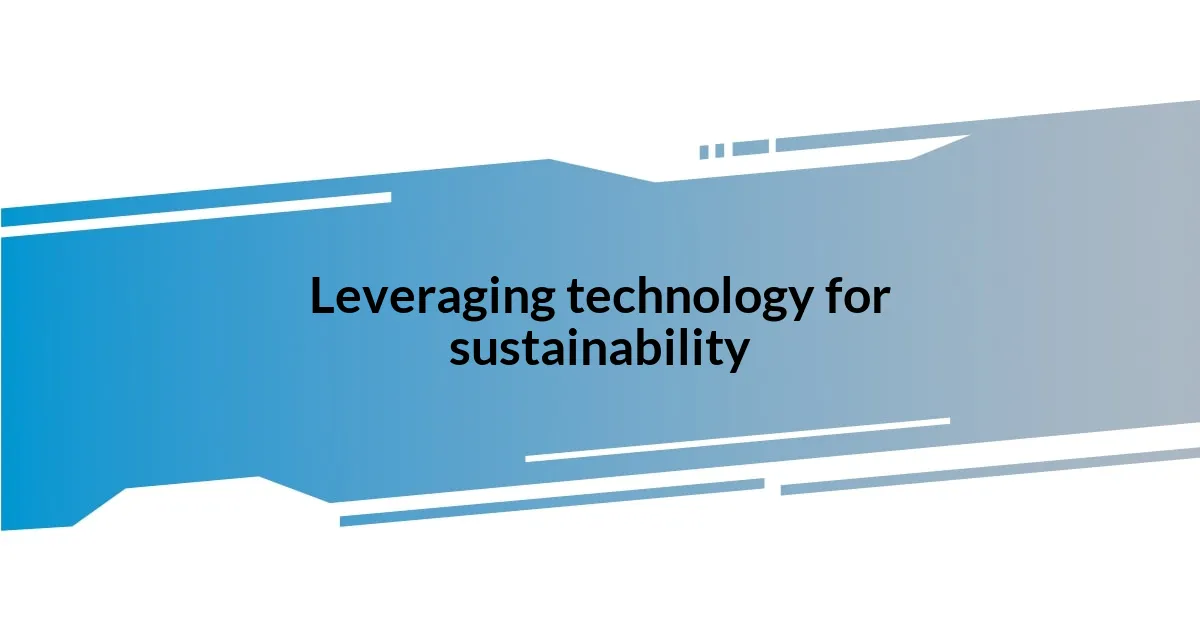
Leveraging technology for sustainability
Technology plays a pivotal role in advancing sustainable practices in international sales. I remember implementing a cloud-based management system that allowed my team to track shipments and inventory in real-time. This not only reduced waste from overproduction but also optimized logistics, ensuring we operated more efficiently and reduced our carbon footprint. Isn’t it incredible how a simple technological upgrade can lead to profound sustainability benefits?
By utilizing data analytics, I’ve been able to understand market trends and consumer behaviors with greater clarity. This insight allows for more tailored offerings that align with sustainability goals. For example, I adjusted our product line based on analysis suggesting a rising demand for eco-friendly products. This not only met customer needs but also reinforced our commitment to sustainable practices. How often do we overlook the potential of just analyzing the data we already collect?
Finally, employing renewable energy technologies in our operations has not just been a cost-saving measure but a moral imperative. In my previous role, we installed solar panels in our warehouses, significantly reducing reliance on non-renewable energy sources. The satisfaction of knowing that our operations were powered by clean energy was an exhilarating feeling. This shift not only galvanized our staff but also attracted environmentally-conscious partners who shared our commitment to sustainability. What better way to stand out in the marketplace than by leading through responsibility?
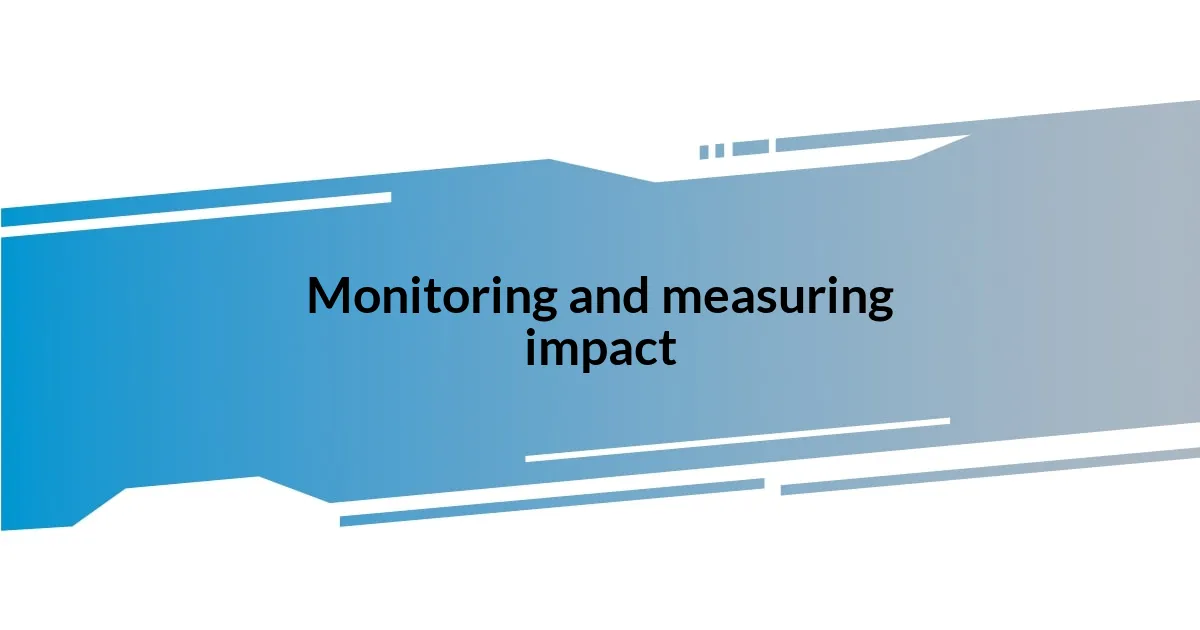
Monitoring and measuring impact
Monitoring and measuring impact is crucial in understanding the effectiveness of sustainable practices in international sales. I recall when my team implemented a quarterly review process to assess our initiatives. The first time we analyzed our eco-friendly product sales, I was pleasantly surprised to see a 30% increase, which reinforced our commitment and motivated us to push further. How often do we take the time to evaluate our efforts?
Setting specific key performance indicators (KPIs) can be a game-changer. For instance, we established metrics not just for sales volume but also for customer satisfaction related to sustainability. After implementing this, I noticed that customers appreciated our transparency about sourcing materials, and it reflected positively in their feedback. Isn’t it fascinating how metrics can guide us and strengthen our relationship with the consumer?
Moreover, incorporating feedback loops helps adapt strategies effectively. I remember a time when we received feedback from a customer about the packaging materials we used. By responding proactively to their concerns and adjusting our packaging to be more sustainable, our next customer survey showed a significant uptick in approval ratings. Engaging with our audience in this way made me realize that measuring impact isn’t just about numbers; it’s about making meaningful changes that resonate with our customers’ values.
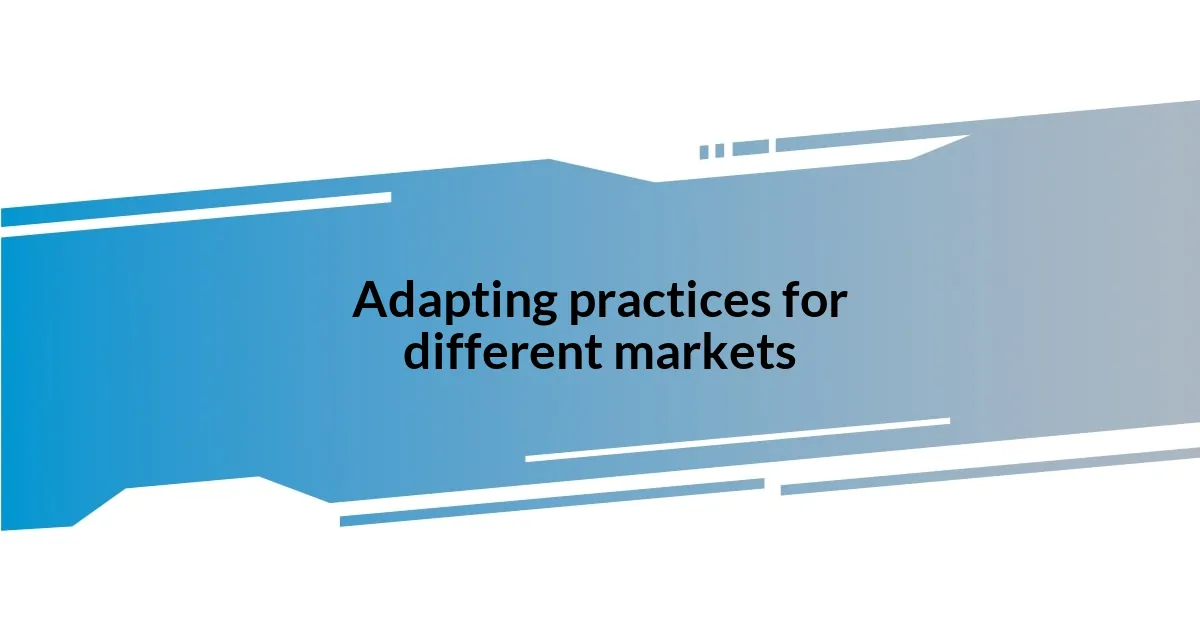
Adapting practices for different markets
Adapting to different markets is more than just a strategy; it’s an art form. When I was expanding my business into Southeast Asia, I quickly learned that the preferences and cultural norms in that region varied drastically from those in the West. For example, packaging that resonated in Europe was seen as excessive in some parts of Asia, where minimalism is valued. It’s moments like these that make you realize how crucial it is to listen intently to local sentiments.
In my experience, testing the waters with pilot programs can be incredibly insightful. A few years ago, I launched a small-scale trial of our organic product line in Latin America. The initial feedback revealed that consumers were deeply passionate about health and wellness, but they preferred flavors and ingredients that were locally sourced. Who would have thought that a simple taste test could redefine our approach? It was both a learning experience and a reminder that consumer engagement can shape a product’s success.
Lastly, building relationships within the local community has proven invaluable. During a visit to a trade fair in Africa, I had the opportunity to connect with local distributors who emphasized the importance of sustainable practices in their culture. Hearing their stories about how sustainability impacts their daily lives shifted my perspective, reinforcing that adapting to local practices is not just about compliance but about respect and genuine collaboration. Isn’t it amazing how human connections can inspire leaps toward more sustainable practices?
